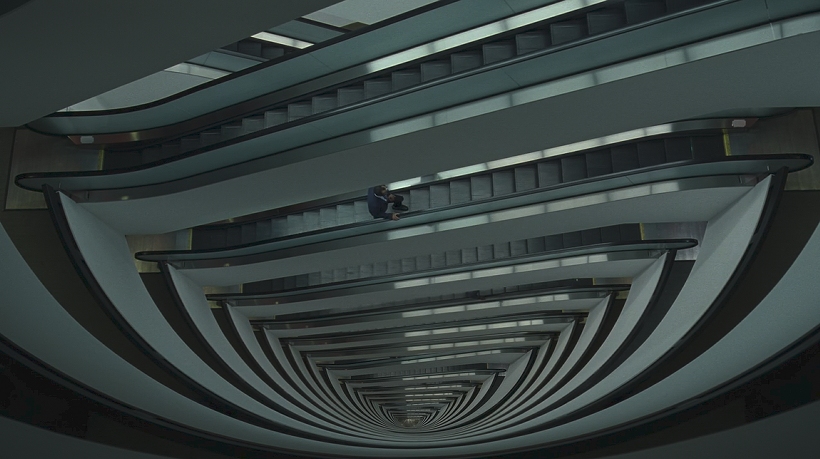
From X-Files, LOST, Fringe, Awake and True Detective, it seems that television still has something to offer that tickles wild, creative speculation (I’ve yet to see Mr. Robot, so I don’t know if it fits there too). Now we have Westworld, that exists perfectly in the same fold. That it is so clever and ambitious, and about the very stuff I enjoy the most that I’m surprised it can actually exist, and that I fear won’t even get close to its full potential since they planned something like six seasons and I seriously doubt the larger public is going to stick with a product that is so dense and layered. It’s my own particular quirky, eccentric flavor. It is going to have an hard time trying to please everyone else while retaining its ambition.
So I’m also thankful to read someone like Jeff Jensen, who during LOST, Fringe and True Detective was writing the ‘recaps’ on EW, but they just weren’t simply recaps, they were OPENING the episodes WIDE. They were bursting with interesting ideas and possibilities. Shows like Fringe were always more powerful about what they were suggesting than what they were explicitly doing. Because it’s fun to run with the ideas and see how they might play out in different contexts. To see what they actually mean outside strict plot functionality. The ‘meta’ was more fun than the explicit content.
All this long premise to say I’m going to interpret Westworld in ways that probably no one has attempted or will attempt. I’m pushing the ideas to their limit, instead of sticking to what the authors plausibly drove toward. I’m running with it. But this without disrupting the content of the show. I’m not writing “fan theories”, I’m exploding out the interpretations. The bigger picture. The ‘meta’ itself.
The first thing is the image above that probably everyone else dismissed without a thought. The mise en abyme. Not only this is a symbolic concept written in the show: the effect is what you obtain playing with mirrors, and mirrors have a role in the “consciousness” of the AI, we’ve seen multiple scenes where Dolores looks at herself in a mirror (it’s by seeing herself that she can question her own reality, of course), but at the same time this also symbolically represents the ‘meta’ of the show. There are fictional ‘showrunners’ that write the stories taking place inside the park, as if the park was a surrogate of the TV show itself. A game of mirrors: what is inside reflects what’s outside, recursively. This is purely second-order observation, second-order cybernetics. But it doesn’t stop there, because that image also represents consciousness itself. Hofstadter’s strange loops. Human consciousness is shaped recursively, self-observing in a pattern. It returns on itself, over and over, until everything blurs out of definition. It applies to itself over and over the distinction between system and environment (Spencer Brown Laws of Form as used by Niklas Luhmann). An observing system in order to make an observation operates a distinction. While self-observing the observing system makes a distinction between the self that observes and the self that is observed. Being both subject and object, it obtains a double from a whole. It creates the Cartesian dualism that makes human experience possible, and makes it alienated from reality (reality that has no actual dualistic levels, it all operates on one). The fundamental illusion that is one of the basic premises of consciousness.
The second aspect is the wildest one, and the one I’m pretty sure absolutely no one is going to contemplate. You can read it here, and that’s it. I’d really challenge the writers of the show because I’m sure they didn’t dare go there, or even THINK about seeing it this way.
Here’s a couple of quotes from Alan Moore talking about his book, Jerusalem:
If you read only one Alan Moore Jerusalem interview, make it this one
Deep into our six-hour talk, somewhere around the dessert (three scoops of ice cream for Moore, hold the whipped cream), the Sage of Northampton is explaining how he came to see the world as Doctor Manhattan does. In 1994, he experienced an “absolute, crystalline understanding” during a magical ritual. Since then, Moore has believed, as Einstein supposedly did, that time is a solid in which our lives are embedded; it is only our perception of it which makes it appear linear.
In other words, everything that has ever happened is still happening. Everything which is about to happen has already happened. We never truly die: the lives we are living now are solid and eternal. That’s all major religions out of business, then.
“The thing is,” says Moore, “we don’t have free will, or at least that’s what I believe, and I think most physicists tend to think that as well, that this is a predetermined universe. That’s got to pretty much kill religion because there aren’t any religions that aren’t based on some kind of moral imperative. They’ve all got sin, karma or something a bit like that. In a predetermined universe how can you talk about sin? How can you talk about virtue?”
Four decades later, this year, he was doing a spoken performance in Milton Keynes, in which he riffed on an article in New Scientist which speculated that because we will soon have quantum supercomputers capable of holding more particles than there are in the entire universe, we will then be able to simulate an entire universe, including all the life forms in it, which will not know they are simulated.
“And if we’re going to be able to do this,” says Moore, “the odds of this being the first time this has happened are vanishingly small. It is much more likely that we are in a simulation, of a simulation, of a simulation, and so on.”
The programmer of the game, therefore, will be God. And if he is at all like the humans he has created, the article postulated, he will want to put an avatar of himself in the game.
Westworld 2nd episode:
“Everything in this world is magic, except to the magician.”
See what I did, when you use that as a frame of reference for Westworld?
Westworld’s “hosts”, the AIs, exist in the exact same context Alan Moore described.
A simulation, of a simulation, of a simulation, over and over. This equals the hosts storing in their memory archive their previous ‘roles’ and ‘storylines’. At every cycle they are reset and restarted. At the same time an external observer can go sift through those memories and consider them as a kind of “solid”, something that already went through and that can be replayed.
So, the AIs of Westworld represent metaphorically the same structure to the larger system of reality. Trapped into cycles but without means of accessing information of the previous ones. Bound to that occluded horizon, caged in their fictional lives.
This is, once again, a game of mirrors. You artificially fabricate an AI that reflects life as it is experienced. It recursively recreates itself. Consciousness is the status of being trapped inside. And the AI consciousness is not unlike the one of its creators. The same rules apply.
And so the third aspect. How consciousness for these AIs works. This is specifically something that the last third episode provided, in two particular moments.
The first is the mention of the Bicameral Mind theory by Julian Jaynes. Quoted as a first attempt to reproduce and unlock the mystery of human consciousness. They say they eventually abandoned that approach, but it is interesting they referenced it specifically.
Then, Dolores’ first display of something that resembles consciousness is that even in analysis mode she isn’t able to “explain” something she said. Something “unexpected” happens. But the truly important aspect is that she doesn’t know. She’s unable to track her own thought.
This is fundamental because it reproduces Scott Bakker theory of consciousness (Blind Brain Theory). You can read here an absolutely perfect story that explains it intuitively:
https://rsbakker.wordpress.com/2016/03/22/the-dime-spared/
It is defined “conscious” a thought process that the mind isn’t able to track. A thought that “appeared” in Dolores’ mind that she doesn’t know how it came to be. That seems to be non-consequential, outside the domain of self-analysis.
The Bicameral Mind can too be interpreted as a form of a similar feature, if much simplified. One “chamber” doesn’t know the existence of the other, so the conscious mind “receives” thoughts that seem external, alien. That come from somewhere else, a god. A memory that one has but cannot recall. Even in this case the basic feature is the occlusion.
Consciousness, in Bakker’s Blind Brain Theory, is “a magic show”. Or more precisely, it’s absence of information.
The magician can make you believe an object magically moved from one hand to the other by hiding the movement itself. It’s information that was withdrawn. Hence that object magically jumped from one hand to the other because you missed the information of the actual movement.
In the same way consciousness is just a magic trick. Since consciousness is structurally blind to its own process, consciousness cannot see how thoughts are actually formed. It doesn’t know their true origin. They just suddenly appear. And what consciousness can do through introspection is to confabulate an explanation. Post hoc.
We don’t know if the AI in Westworld is faithful to this theory. But for now it respected the basic feature of what we recognize as consciousness: the impossibility to track a thought. The trackless space. The invisibility of the mental process to itself.
The ideal of the cosmic cycles of simulated reality, downsized and applied to the single AI system, creates the possibility of a kind of “bicameral mind”. The AI receives inputs from previous cycles. These are experiences that are unhinged from a sense of history that the consciousness is able to track (since the AI consciousness can only normally access memories that are part of the current active cycle). They are alien thoughts, alien voices, interferences that will have to be confabulated back into an explanation.
But again, the basic feature that creates consciousness is not the source of those thoughts, what’s truly crucial is simply the occlusion of the process itself: the fact that the AI can’t track its own process, that it is blind to itself.
Consciousness is not freedom. Consciousness is withdrawal of information. The more limited your access, the more conscious you are. Freedom by darkness.
Are Westworld showrunners even aware of what they’re doing? Or are they stumbling into all this because that’s the natural point where these things ultimately lead, regardless of the path you take?

